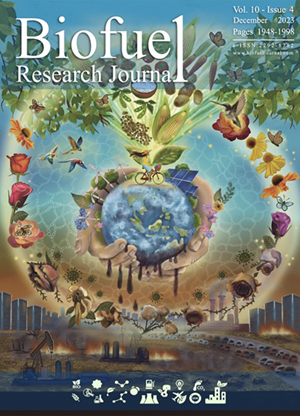A critical review of machine learning for lignocellulosic ethanol production via fermentation route
IF 11.9
Q1 ENERGY & FUELS
引用次数: 5
Abstract
In this work, machine learning (ML) applications in lignocellulosic bioethanol production were reviewed. First, the pretreatment-hydrolysis-fermentation route, the most commonly studied alternative, was summarized. Next, a bibliometric analysis was performed to identify the current trends in the field; it was found that ML applications in the field are not only increasing but also expanding their relative share in publications, with bioethanol seeming to be the most frequently researched topic while biochar and biogas are also receiving increased attention in recent years. Then, the implementation of ML for lignocellulosic bioethanol production via this route was reviewed in depth. It was observed that artificial neural network (ANN) is the most commonly used algorithm (appeared in almost 90% of articles), followed by response surface methodology (RSM) (in about 25% of articles) and random forest (RF) (in about 10% of articles). Bioethanol concentration is the most common output variable in the fermentation step, while fermentable sugar and glucose concentration are studied most in hydrolysis. The datasets are usually small, while the fitnesses of the models (R2) are usually high in the papers reviewed. Finally, a perspective for future studies, mostly considering improving data availability, was provided.机器学习在木质纤维素乙醇发酵生产中的应用综述
本文综述了机器学习技术在木质纤维素生物乙醇生产中的应用。首先,综述了研究最广泛的预处理-水解-发酵途径。接下来,进行了文献计量分析,以确定该领域的当前趋势;研究发现,机器学习在该领域的应用不仅在增加,而且在出版物中所占的相对份额也在扩大,其中生物乙醇似乎是最常见的研究主题,而生物炭和沼气近年来也受到越来越多的关注。然后,对通过该途径实现木质纤维素生物乙醇的ML生产进行了深入的综述。研究发现,人工神经网络(ANN)是最常用的算法(出现在近90%的文章中),其次是响应面法(RSM)(约占25%)和随机森林(RF)(约占10%)。生物乙醇浓度是发酵过程中最常见的输出变量,而水解过程中研究最多的是可发酵糖和葡萄糖浓度。数据集通常很小,而模型的适应度(R2)在所审查的论文中通常很高。最后,提出了未来研究的展望,主要考虑改善数据的可用性。
本文章由计算机程序翻译,如有差异,请以英文原文为准。
求助全文
约1分钟内获得全文
求助全文
来源期刊

Biofuel Research Journal-BRJ
ENERGY & FUELS-
CiteScore
22.10
自引率
1.50%
发文量
15
审稿时长
8 weeks
期刊介绍:
Biofuel Research Journal (BRJ) is a leading, peer-reviewed academic journal that focuses on high-quality research in the field of biofuels, bioproducts, and biomass-derived materials and technologies. The journal's primary goal is to contribute to the advancement of knowledge and understanding in the areas of sustainable energy solutions, environmental protection, and the circular economy. BRJ accepts various types of articles, including original research papers, review papers, case studies, short communications, and hypotheses. The specific areas covered by the journal include Biofuels and Bioproducts, Biomass Valorization, Biomass-Derived Materials for Energy and Storage Systems, Techno-Economic and Environmental Assessments, Climate Change and Sustainability, and Biofuels and Bioproducts in Circular Economy, among others. BRJ actively encourages interdisciplinary collaborations among researchers, engineers, scientists, policymakers, and industry experts to facilitate the adoption of sustainable energy solutions and promote a greener future. The journal maintains rigorous standards of peer review and editorial integrity to ensure that only impactful and high-quality research is published. Currently, BRJ is indexed by several prominent databases such as Web of Science, CAS Databases, Directory of Open Access Journals, Scimago Journal Rank, Scopus, Google Scholar, Elektronische Zeitschriftenbibliothek EZB, et al.
 求助内容:
求助内容: 应助结果提醒方式:
应助结果提醒方式:


